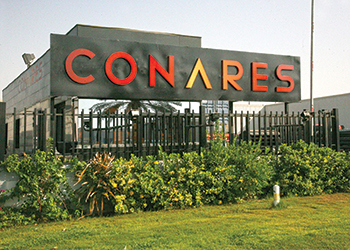
 Grove ... ASTM well received.
Grove ... ASTM well received.
JEFF GROVE, vice president, global policy and industry affairs at ASTM International, highlights his organisation’s role in boosting steel and construction standards in the Gulf.
Technical standards have become a crucial foundation for infrastructure growth throughout the Gulf, including projects that involve steel. Standards from ASTM International – a standards development organisation that has been involved in the metals industry for more than a century – have been particularly well received in this region.
For example, the Qatar Construction Specifications (QCS) references more than 700 ASTM standards. In addition, about 40 per cent of the standards referenced in the Abu Dhabi International Building Codes are from ASTM. Meanwhile, in Saudi Arabia, companies such as Bechtel – which is leading the BACS consortium working on the Riyadh Metro network – often use ASTM standards on some of their key projects.
ASTM has memorandums of understanding with all Gulf nations as well as the GCC Standards Organization, whose secretary general Nabil Molla sits on ASTM’s board of directors. Overall, 150 experts from GCC countries are involved with ASTM, and ASTM standards have been cited more than 4,000 times in the region’s standards, regulations, and codes.
Interestingly, related to this theme issue on steel, ASTM was created in the late 1800s because of the US railroad industry’s need for steel standards. At the time, failures in railroad infrastructure jeopardised public safety and posed the threat of bringing commerce to a standstill, potentially crippling America’s growing rail industry. Recognising the need for a standard test method for steel used to manufacture railroad components, a group of scientists and engineers formed ASTM and its first committee, A01, on steel.
Using a consensus-driven process that ASTM still uses today, these individuals published the first standard — A1 on Carbon Steel Tee Rails — in 1901. This standard improved rail safety for the public and helped industry growth worldwide in the following decades. Standard A1 has been through numerous revisions and plays an active role today in meeting the needs of fast-growing regions such as the Gulf.
Today, Committee A01 (which now includes steel, stainless steel and related alloys) has a membership of more than 1,300 industry leaders and experts, including more than 200 international participants from the Gulf and elsewhere. This group provides standards for testing and manufacturing steel used for buildings, roads, bridges, railroads, desalination plants, and more.
Examples include:
• The specification for carbon structural steel (A36/A36M), which is widely referenced for steel used in riveted, bolted or welded construction of bridges and buildings;
• The specification for zinc and epoxy dual-coated steel reinforcing bars (A1055/A1055M), which supports the production of high-performance, corrosion-resistant steel;
• The ASTM practice for portable hardness testing by the ultrasonic contact impedance method (A1038), which supports better use of portable equipment for testing large steel pieces without the need for their removal from the forging; and,
• The specification for chromium and chromium-nickel stainless steel plate, sheet, and strip for pressure vessels and for general applications (A240/A240M), which supports corrosion-resistant stainless steel in Gulf desalination plant projects.
In addition, ASTM recently entered into a new partnership with the US Department of Commerce and the International Code Council in an effort to support sustainable construction throughout the Gulf. The organisation’s goal is to enhance the region’s efforts to build in a way that supports energy efficiency, water conservation, materials management, building safety, and overall economic growth.
This effort involves new seminars, workshops, and training sessions, the first of which was held on May 6 in Doha, Qatar, with the support of the Gulf Organization for Research and Development (GORD). Also as part of this effort, ASTM will host exhibits at trade shows and other events attended by Gulf leaders, such as Greenbuild in Washington, DC, in November (18 to 20). Further information about this new partnership is available at: www.astm.org/MDCP.
Given ASTM’s deepening involvement in the Gulf, it is not surprising that its next board of directors meeting outside of the US will take place in Dubai, UAE, in October 2016.





















_0001.jpg)


.jpg)
















.jpg)








.jpg)



